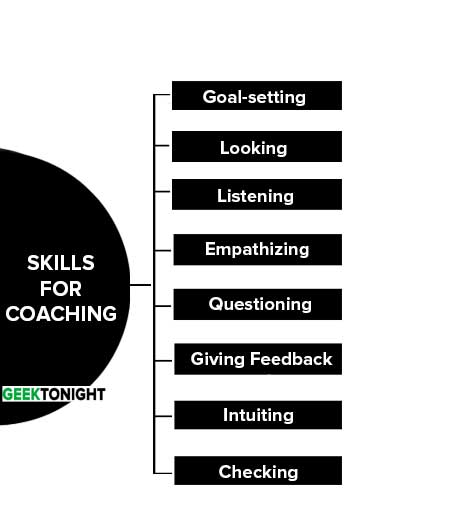What is Coaching?
Coaching means to improve performance often short term in a specific skills area. The goals are basically set by the coach; let it be intermediate goals or sub-goals to achieve. Direct feedback is present in coaching.
In case of mentoring it is generally related to recognition and nurturing of potentialities of the whole person. The goals and process both are decided by the learner himself. It is associated with long term relationships.
The mentor helps to the learners in developing insight and understanding by observation. Knowing their own strengths and weaknesses is included in mentoring.
Table of Content
- 1 What is Coaching?
- 2 What Coaching is Not?
- 3 Coaching Is Not Mentoring
- 4 Coaching Is Not Counselling
- 5 Objectives of Coaching
- 6 Process of Coaching
- 7 Skills for Coaching
- 8 Role of HRD Professional in Coaching
- 9 External and Internal Coach
- 10 Coaching to Improve Unsatisfactory Performance
- 11 Learning to Coach
What Coaching is Not?
Coaching is an important part of any effort to bring out the best in an individual worker. In fact, it is a key skill that contributes to human resource development. A coach’s key role is to help an individual improve what they are doing. They do this by giving the person they are coaching helpful, productive feedback about their performance.
The process usually involves the individual first identifying areas for improvement (with the help of the coach) and then developing skills or competencies on the job, backing that up with informal or formal training sessions or even college courses.
In a typical manager-employee relationship, coaching is an ongoing cycle of goals and desired outcomes, plans, experimental actions, learning opportunities, reflections that ultimately lead to greater competence. Coaching implies motivating, inspiring, taking people to greater heights.
It is a directive process by the manager to train and orientate an employee to the realities of the workplace, and to assist in removing the Coaching and Mentoring barriers to optimum work performance
Coaching is not training, mentoring and Counseling Coaching is not training. While training and coaching both promote learning, they do so in different ways:
- Training is about teaching specific skills or knowledge – Coaching is about facilitating someone else’s thinking and helping them learn on the job.
- Training usually takes place off-site or in dedicated classes – Coaching takes place in the office and (when carried out by a manager) can be integrated into day-to-day workplace conversations.
- Training is more typically carried out in groups – Coaching is usually a one-to-one process, tailored to the individual’s needs.
- Training is usually delivered by an external consultant or dedicated internal trainer – Coaching can be delivered by an external consultant or by a manager.
Coaching Is Not Mentoring
There are some superficial similarities between coaching and mentoring, as they are both typically one-to-one conversations aimed at facilitating professional development, but there are also significant differences:
- A Mentor is usually a more senior person, who shares experience and advises a junior person working in the same field – A Coach is not necessarily senior to the person being coached, and not typically give advice or pass on experience; instead s/he uses questions and feedback to facilitate the other person’s thinking and practical learning.
- A Mentor is not typically the line manager of the person being mentored, but someone who is available for advice and guidance when needed – Coaching is frequently delivered by line managers with their teams.
Coaching Is Not Counselling
There may be a superficial similarity in that both of these activities are one-to-one conversation, but their tone and purpose are very different:
- Counselling and therapy deal with personal problems while Coaching addresses workplace performance.
- Counselling begins with a problem while Coaching can begin with a goal or aspiration.
- Counselling is sought by people having difficulties while Coaching is used by high achievers as much as beginners or people who are stuck.
- Many (but not all) forms of counselling focus on the past and the origins of problems while Coaching focuses on the future and developing a workable solution.
Objectives of Coaching
- Helping him to realise his potential as a manager.
- Helping him to understand himself – his strengths and his weaknesses.
- Providing him an opportunity to acquire more insight into his behaviour, and analyse the dynamics of such behaviour.
- Helping him to have better understanding of the environment.
- Increasing his personal and inter-personal effectiveness through effective feedback.
- Encouraging him to set goals for further improvement.
- Encouraging him to generate alternatives for dealing with his problems and
- prepare an action plan.
- Helping him to review in a non-threatening way his progress in achieving various objectives.
- Providing empathetic atmosphere for sharing and discussing his tensions, conflicts, concerns and problems.
Process of Coaching
Process of Coaching has the following steps:
- Setting developmental goals that are reasonable, attainable, and derived from a careful analysis of the areas where an employee needs to improve. These goals should take into account both short-term and long-term career objectives.
- Identifying resources and strategies that will help the employees achieve developmental goals.
- Implementing strategies that will allow the employee to achieve the developmental goals.
- Collecting and evaluating data to assess the extent to which each of the developmental goals has been achieved.
- Providing feedback to the employee and then revising developmental goals as needed.
Skills for Coaching
Coaching focuses on helping another person learn in ways that let him or her keep growing afterward. It is based on asking rather than telling, on provoking thought rather than giving directions and on holding a person accountable for his/her goals.
The necessary key skills for coaching are as follows:

Goal-setting
Coaching is a goal-focused (or solution-focused) approach, so the ability to elicit clear, well-defined and emotionally engaging goals from the coaches is one of the most important skills for a coach to possess. Like many aspects of coaching, there are both formal and informal versions of this skill.
On the formal side, a coach needs to know how and when to introduce goal-setting into the coaching process, and will usually be familiar with models such Coaching and Mentoring as SMART goals (a SMART goal is Specific, Measurable, Attractive, Realistic and Timed).
On the informal side, a coach will typically have the habit of thinking and asking questions from a goal-focused mindset.
Looking
A good deal is rightly written about the importance of listening in coaching, but looking is often (ahem) overlooked. When running coaching skills seminars one often say to the trainee coaches “The answer is right in front”.
Meaning that the person’s body language tells that a huge amount about her/his emotional state and level of commitment, yet it’s so easy to ignore that if we are too focused on our own ideas about what needs to happen next.
Listening
This is often referred to as active listening to emphasize the difference between passively taking in what the other person is saying and actively engaging with them and showing that one is giving them undivided attention. This involves putting his/her own concerns and idea ‘in a box’ while they listen, so can be particularly challenging for manager-coaches, but it’s a skill well worth developing.
Empathizing
Empathy develops naturally out of looking and listening. If one does this attentively, he/she can start to get a sense of the other person’s emotional state.
The ability to empathize is critical for a good business coach, as it not only helps the coach to accept the other person on their own terms, but also sometimes to ‘tune in’ to emotions and thoughts of which the coaches is not fully aware.
Questioning
If one had to pick a thing that distinguished business coaching from other approaches to communication, management and learning, one would say “Questions”. At the heart of coaching is a willingness to put aside one’s own ideas about the ‘best/right/obvious way’ to do something, and to ask a question to elicit someone else’s ideas about how to approach it.
For coaches, being asked a question can do three very important things:
- Focus attention: questions are not directive, but they are influential. They prompt the coaches to look for a new idea or solution in a particular area.
- Elicit new ideas: however ‘obvious’ the answer may seem to the coach, it’s amazing how often coaches will come up with several different and often better alternatives.
- Foster commitment: there’s a huge difference between doing something because it has been told or suggested, and doing something that one has dreamt up yourself.
Giving Feedback
This is always a hot topic when one run’s coaching seminars. It’s a big subject, but the key to delivering effective coaching feedback is that it is observational and non-judgmental.
If a person provides clear, specific feedback about the coach’s actions and their consequences, then the chances are the coach will be perfectly capable of evaluating his performance for himself.
Intuiting
Like empathy, this is either innate ability or emerges from practising the other coaching skills. Sometimes during a coaching session, one can get a sudden thought or feel about the coaches or the subject under discussion – it’s as if something is prompting to ask a question or share what he/she is thinking/feeling.
Checking
There is a separate skill in coaching books, it is one of the most important habits for a coach to get into, and it can take considerable skill to know what, when and how to check.
It might seem pedantic or boring relative to the ideas and energy generated elsewhere in the coaching conversation, but if one doesn’t keep checking about an understanding of the client, whether the coachee has taken action, whether she has achieved the goal risk would let all the creativity and enthusiasm evaporate.
Role of HRD Professional in Coaching
The best and most successful human resource professionals is to learn early on how to gain and use influence to become more of a strategic partner, to determine where the organization is headed and to use the human resources function to guide the way.
As an HR professional or manager in a coaching role, he/she educate the managers and supervisors as one work with them as a supportive partner and coach. The goal is to make them self-sufficient. One give them the tools they need to be successful in their business-related and interpersonal functions, also assist by supplying a process they can follow to build their own skills.
A manager should leave an HR professional-feeling stronger, more knowledgeable, and more capable of addressing the opportunities in the future. The HR professional is a resource for managers who seek out her services. She/he does not control the relationship or the actions and decisions of the person she is coaching.
At best, the HR manager forms a partnership with the coached manager that results in good choices for the organization and personal growth for the manager. The manager, however, makes the final decision about what she/he will do in any given situation. One’s knowledge, effectiveness as a communicator, and developed relationship with the manager and the perceived competence will impact a manager’s willingness to use one coaching input.
External and Internal Coach
What is External Coach?
External coach at times is also called executive coach is defined as coaches who do not work for the organization. An external coach is a consultant brought into the organization to work with individuals and/or teams, usually in sessions lasting 1-2 hours.
Ideally the coaching conversation is a face-to-face meeting, at least for the first few sessions, although the phone and now webcam are increasingly used, as they allow for greater flexibility in scheduling appointments.
Coaching sessions are often interspersed with e-mail reports on agreed action items. The position of an external coach is a privileged one since she /he is free from many of the restrictions that apply to managers – so there is a responsibility to use these advantages wisely, for the benefit of the individuals being coached and also the organization as a whole.
What is Internal Coach?
An internal coach is defined as an employee within the organization who is not directly involved in the coaches work (e.g. a member of an HR department) The internal coach is comparable in every sense to the external coach, with the exception that the internal coach in an employee of the same organization as their coaches.
Frisch (2001) offers the following definition “Internal coaching is a one-on-one developmental intervention supported by the organization and provided by a colleague of those coached who is trusted to shape and deliver a program yielding individual professional growth”
Coaching to Improve Unsatisfactory Performance
Another area of coaching is in the area of challenging or confronting for performance improvement. When a person is not able to deliver the performance required, he/she may have a variety of emotional reactions such as despair, resistance, self-justification, or even complete unawareness.
In this situation, the coaching approach is to deal with these by focusing on clear expectations. Most often these expectations have not been properly mapped out or clearly understood.
At the same time as staying aware of the other person’s reactions, gathering information and agreeing where the problem lies are essential next steps. In dealing with underperformance, the following pattern, for a coach, can be useful and are given:
- To get the clarity about the situation: what is the current performance, and what it is expected to be;
- To lay aside feelings of blame and irritation and gather information about how individuals are reacting. Their awareness of the performance shortfall, and what they see as the problems.
- To get the person being coached to share in identifying the problems, adding their own perspective and ask them for possibilities to resolve them. At this stage, it is particularly important to maintain a positive and clear relationship, focusing forward on next steps and change.
- To establish a process whereby the employee will set up a plan for informing the coach/ manager of progress against clearly stated goals.
Learning to Coach
We can understand the value of coaching that it establishes an effective and dynamic working relationship in difficult and changing situations. The managers are encouraged to coach by ‘manager as coach and developer’ initiatives. These initiatives may take the form of workshops or of elements of management development programmes.
The training and development responsibilities are being developed more and more to line managers. Due to this, the pressure on them to work in this way increases. There is often a certain amount of resistance to adopting a coaching style of management. In the first instance; this resistance may also be in reaction to the hype that is in some cases connected with approaches to coaching.
The resistance may be overcome by starting the coaching from the top and the managers who are expected to move to a coaching style may themselves need to be coached. This experience helps the managers to understand the value of coaching at first-hand, and to get an intuitive sense of how to do it themselves.
Go On, Share & Help your Friend
Did we miss something in Human Resource Tutorial or You want something More? Come on! Tell us what you think about our post on What is Coaching? in the comments section and Share this post with your friends.
Human Resources Tutorial
(Click on Topic to Read)





